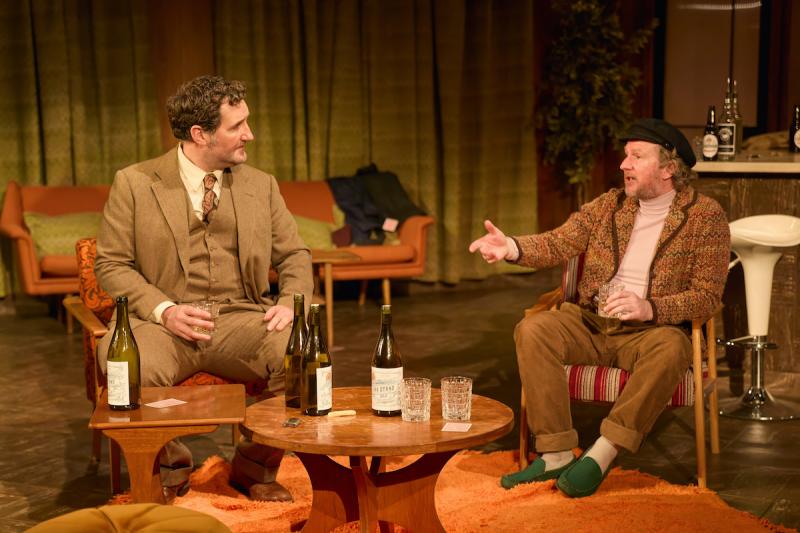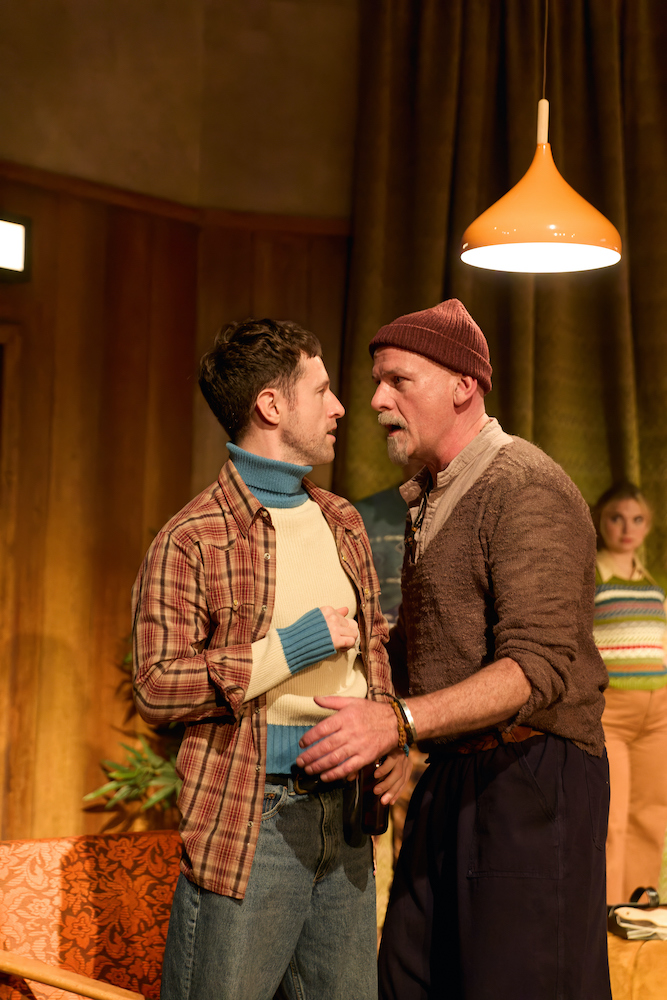Reykjavik, Hampstead Theatre review - drama frozen by waves of detail | reviews, news & interviews
Reykjavik, Hampstead Theatre review - drama frozen by waves of detail
Reykjavik, Hampstead Theatre review - drama frozen by waves of detail
Richard Bean’s new play revisits the Hull fishing industry of the 1970s

“Don’t take a piss in the house of a woman you have made a widow.” The mixture of earthy comedy and tragic pain in this piece of parental advice is typical of the tone of Richard Bean’s Reykjavik, his new work play which explores the lives of the Hull trawlermen of the mid-1970s.
As its title suggests, the story revisits the long-lost world of fishing in Arctic waters, and an industry which Bean also explored in his 2003 play, Under the Whaleback, which premiered at the Royal Court. Now a regular at the Hampstead Theatre, his new work has the distinct feeling of a throwback not only to his own background, but also to the theatrical style of the 1970s. Because he was born and bred in Hull, his portrait of life in that city is deeply felt and often strongly emotional, but is that enough to make it a good play?
Reykjavik begins in Hull, in the office of Donald Claxton, the boss of a distant-water trawling company. It’s February 1976, and one of his ships has recently sunk, with 15 deaths and a handful of survivors, who are stranded in Iceland. As he prepares to take the traditional widows walk, visiting each of the houses of the bereaved on foot, he is visited by his father, who gives him advice, a fisherman’s wife, who gives him grief, a useless skipper, who he has to sack, and a recently arrived hippy vicar, who he instructs about the memorial. This act is tightly written, with a fine balance of comedy and seriousness, and sets up the drama of Act Two.
So after the interval we arrive, along with Donald, in Reykjavik, where the survivors are staying at a cheap hotel. They are Jack, the husband of the wife from the first part, Snacker, a foolish youth with a taste for girls and magic tricks, Baggie, an experienced trawlerman, and Einhildur, the young Icelandic woman who runs the place. As the men struggle to enjoy a drink in a country whose prohibition laws require them to mix non-alcoholic beer with sharp spirits, the comedy grows darker with the arrival of Donald, who will bring them home, and Quayle, an Irish-Manx ancient mystical mariner who arrives with the coffin of one of the tragedy’s victims. Everything is ready for a explosion of emotion.
 The problem with the play, however, is that when the drama, which involves the violent class antagonism between Jack the casual worker and Donald the capitalist, finally peaks – in a tense sequence involving a large knife – its fury is dissipated by all the other elements which Bean has deposited in this long second half. These include the true story behind Donald’s widows walk, a whole series of ghost stories (uncannily reminiscent of Conor McPherson’s The Weir), background information about Iceland’s vote to extend its fishing waters and exclude the British fleets, the referendum on staying in the Common Market, some traditional songs and laments, lots of laddish jokes, and the start of an unlikely love affair. So although Bean’s dialogues are powerfully realised, the slackness of the plotting makes this more of a love letter to old Hull than an exciting well-plotted drama.
The problem with the play, however, is that when the drama, which involves the violent class antagonism between Jack the casual worker and Donald the capitalist, finally peaks – in a tense sequence involving a large knife – its fury is dissipated by all the other elements which Bean has deposited in this long second half. These include the true story behind Donald’s widows walk, a whole series of ghost stories (uncannily reminiscent of Conor McPherson’s The Weir), background information about Iceland’s vote to extend its fishing waters and exclude the British fleets, the referendum on staying in the Common Market, some traditional songs and laments, lots of laddish jokes, and the start of an unlikely love affair. So although Bean’s dialogues are powerfully realised, the slackness of the plotting makes this more of a love letter to old Hull than an exciting well-plotted drama.
His trademarks – eccentric characters, a clever woman and good jokes – are here in abundance, and the ambition of painting a realistic picture of a world we have lost is partially realised. But the result, despite its reliance on some of the familiar trope of 1960s and 1970s work plays, is more social archaeology than theatrical punch. That said, there are pleasures to be had: sharp phrases like “If you’re looking for sympathy you’ll find it in the dictionary between shit and syphilis”; the compelling details of the most dangerous job in Britain; and the deep sense of connection with the past.
Although the action takes place on land, the terrifying power of the sea – with its strange moods and sheer unpredictability – is ever present, and the brutality and indifference of nature creates a scepticism about the existence of God. With no God, these men and women believe in fate, in superstitious acts, in traditional ways of mental survival. They are 20th-century pagans. Most of this material is fascinating, and Bean presents it in a compelling way. There’s even a recording of a dead captain’s last words as his ship sinks in icy seas.
The clash between the capitalist and the casual worker is shown dispassionately and unsentimentally, while the gender politics are also present. Despite the slightly repetitive nature of some of the material, director Emily Burns – who according to the programme note also did considerable dramaturgical work on the play – does a good job in creating a production that makes up in atmosphere what it lacks in dramatic tension. The two locations, Hull and Reykjavik, are very well realised in all their grubby glory by designer Anna Reid, and Oliver Fenwick and Christopher Shutt contribute the fizzing lighting and doomy sound that give the Icelandic half its high points of eeriness.
The sense of folk tales and ancient beliefs living on into modern times comes across strongly in the design of the production, which has a real 1970s retro feel. Likewise impressive is the acting. John Hollingworth’s Donald, the Cambridge Eng Lit grad who comes from fishing folk but never actually worked at sea, and who names his boats after famous authors, is excellent. And most of the cast play two roles: Paul Hickey is his dad and Quayle (pictured above right, along with Matthew Durkan, who is both the happy-clappy vicar and the angry Jack); Adam Hugill the failed skipper and feeble apprentice Snacker; Sophie Cox the secretary and Einhildur. Then Matt Sutton plays Baggie and Laura Elsworthy is the frustrated fisherman’s wife. High points in Iceland include Einhildur’s ghost story, a knife fight and a foot-stomping sea-shanty. So despite some improbable plotting, this is an elegiac portrait of a lost world.
rating
Explore topics
Share this article
The future of Arts Journalism
You can stop theartsdesk.com closing!
We urgently need financing to survive. Our fundraising drive has thus far raised £49,000 but we need to reach £100,000 or we will be forced to close. Please contribute here: https://gofund.me/c3f6033d
And if you can forward this information to anyone who might assist, we’d be grateful.

Subscribe to theartsdesk.com
Thank you for continuing to read our work on theartsdesk.com. For unlimited access to every article in its entirety, including our archive of more than 15,000 pieces, we're asking for £5 per month or £40 per year. We feel it's a very good deal, and hope you do too.
To take a subscription now simply click here.
And if you're looking for that extra gift for a friend or family member, why not treat them to a theartsdesk.com gift subscription?
more Theatre
 Hamlet, National Theatre review - turning tragedy to comedy is no joke
Hiran Abeyeskera’s childlike prince falls flat in a mixed production
Hamlet, National Theatre review - turning tragedy to comedy is no joke
Hiran Abeyeskera’s childlike prince falls flat in a mixed production
 Rohtko, Barbican review - postmodern meditation on fake and authentic art is less than the sum of its parts
Łukasz Twarkowski's production dazzles without illuminating
Rohtko, Barbican review - postmodern meditation on fake and authentic art is less than the sum of its parts
Łukasz Twarkowski's production dazzles without illuminating
 Lee, Park Theatre review - Lee Krasner looks back on her life as an artist
Informative and interesting, the play's format limits its potential
Lee, Park Theatre review - Lee Krasner looks back on her life as an artist
Informative and interesting, the play's format limits its potential
 Measure for Measure, RSC, Stratford review - 'problem play' has no problem with relevance
Shakespeare, in this adaptation, is at his most perceptive
Measure for Measure, RSC, Stratford review - 'problem play' has no problem with relevance
Shakespeare, in this adaptation, is at his most perceptive
 The Importance of Being Earnest, Noël Coward Theatre review - dazzling and delightful queer fest
West End transfer of National Theatre hit stars Stephen Fry and Olly Alexander
The Importance of Being Earnest, Noël Coward Theatre review - dazzling and delightful queer fest
West End transfer of National Theatre hit stars Stephen Fry and Olly Alexander
 Get Down Tonight, Charing Cross Theatre review - glitz and hits from the 70s
If you love the songs of KC and the Sunshine Band, Please Do Go!
Get Down Tonight, Charing Cross Theatre review - glitz and hits from the 70s
If you love the songs of KC and the Sunshine Band, Please Do Go!
 Punch, Apollo Theatre review - powerful play about the strength of redemption
James Graham's play transfixes the audience at every stage
Punch, Apollo Theatre review - powerful play about the strength of redemption
James Graham's play transfixes the audience at every stage
 The Billionaire Inside Your Head, Hampstead Theatre review - a map of a man with OCD
Will Lord's promising debut burdens a fine cast with too much dialogue
The Billionaire Inside Your Head, Hampstead Theatre review - a map of a man with OCD
Will Lord's promising debut burdens a fine cast with too much dialogue
 50 First Dates: The Musical, The Other Palace review - romcom turned musical
Date movie about repeating dates inspires date musical
50 First Dates: The Musical, The Other Palace review - romcom turned musical
Date movie about repeating dates inspires date musical
 Bacchae, National Theatre review - cheeky, uneven version of Euripides' tragedy
Indhu Rubasingham's tenure gets off to a bold, comic start
Bacchae, National Theatre review - cheeky, uneven version of Euripides' tragedy
Indhu Rubasingham's tenure gets off to a bold, comic start

Add comment